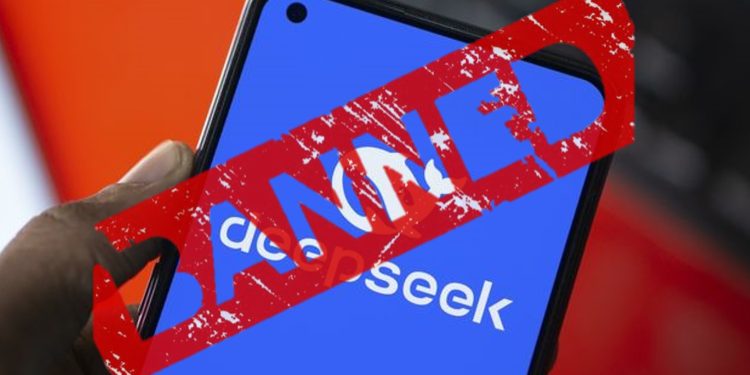Jakarta, Indonesia Sentinel — Recently, several countries have decided to ban DeepSeek due to concerns over data privacy concerns. The Chinese AI company has gained popularity but has also faced negative sentiments, leading to widespread restrictions on its use.
Multiple nations and institutions, particularly in the United States, have blocked access to this AI-powered chatbot. DeepSeek is now banned in several countries and government agencies over ethical, privacy, and security concerns regarding its technology.
The primary concern revolves around data privacy and the potential for sensitive information to be leaked to the Chinese government. According to DeepSeek’s privacy policy, the company stores all user data in China, where local laws require organizations to share data with national intelligence agencies upon request.
This has sparked global fears about the misuse of personal data. Therefore, prompting several governments and institutions to take action against the AI chatbot.
Countries and Institutions That Have Blocked DeepSeek
According to a report by TechCrunch, the following countries and institutions have restricted and decided to ban DeepSeek:
1. Italy
Italy was among the first countries to ban DeepSeek after its data protection authority launched an investigation into the app’s handling of personal data. In late January, Italy’s Data Protection Authority (DPA) examined DeepSeek’s data collection practices and its compliance with the General Data Protection Regulation (GDPR), the EU’s strict data privacy law.
The DPA gave DeepSeek 20 days to clarify where and how user data is stored and for what purposes. After failing to meet these requirements, DeepSeek was removed from Apple’s and Google’s app stores in Italy.
2. Taiwan
Taiwan’s Ministry of Digital Affairs stated that DeepSeek posed a threat to national information security. As a result, it banned the use of the AI application within government agencies.
Public sector employees and critical infrastructure institutions were deemed particularly vulnerable to data leaks and cross-border data transmission risks. The ban on DeepSeek also extends to public schools and state-owned enterprises.
3. Texas
Texas Governor Greg Abbott issued an executive order prohibiting the use of DeepSeek and other Chinese software on government devices. Abbott stressed that Texas would not allow the Chinese Communist Party to infiltrate its critical infrastructure through data-harvesting applications and social media platforms.
“Texas will continue to protect and defend our state from hostile foreign threats,” Abbott stated.
4. U.S. Congress
The U.S. Congress issued a warning to its members, advising them against using DeepSeek. The Chief Administrative Officer (CAO), who oversees business support services for the House of Representatives, reported that DeepSeek had been exploited by malicious actors to deploy malware that could infect devices.
To mitigate this risk, Congress banned the use of DeepSeek on official devices, including smartphones, computers, and tablets.
5. U.S. Navy
The U.S. Navy instructed its personnel to avoid using DeepSeek in any capacity. An internal email prohibited the use of DeepSeek products following security and ethical concerns about the chatbot’s origins and data handling practices.
The Navy emphasized the importance of safeguarding sensitive information and strictly prohibited personnel from downloading, installing, or using the DeepSeek application.
6. The Pentagon
The Defense Information Systems Agency, which manages the Pentagon’s IT networks, decided to block DeepSeek’s website in January. The move came after Pentagon officials expressed concerns about unauthorized employee usage of the chatbot.
However, the Department of Defense still allows limited access to DeepSeek via its official “Ask Sage” platform, which operates separately from the AI’s servers in China.
7. NASA
NASA also banned its employees from using DeepSeek following an internal review of the risks posed by the chatbot’s overseas data storage. In a memo, NASA stated that DeepSeek was unauthorized to access the agency’s data, systems, or government-affiliated devices.
NASA employees are prohibited from using DeepSeek on any government-managed network or device.
Potential Risks
According to Panji Rakyat, the growing global concern centers on the potential violations of privacy and data security linked to AI chatbots like DeepSeek. Given China’s laws requiring companies to share data with the government, many experts worry that users’ personal information could fall into unauthorized hands, including Chinese authorities.
For countries that have banned DeepSeek, data breaches are particularly sensitive due to the vast amounts of personal and institutional data collected by AI applications. Moreover, critical sectors such as the military, government, and financial institutions are at heightened risk of data exploitation.
Read Also:
U.S. and Global Firms Block China’s DeepSeek Over Data Privacy Concerns
Despite DeepSeek’s rapid growth and rising popularity, concerns over privacy, ethics, and data security remain significant obstacles.
Many governments and international organizations have deemed it necessary to take firm action to block or limit the chatbot’s usage to safeguard their data and infrastructure.
With its opaque data policies under scrutiny, DeepSeek’s ability to expand its global reach may be severely challenged unless it addresses these concerns with greater transparency and security measures.
(Raidi/Agung)

























